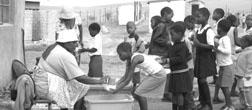 The importance of adhering to antiretroviral (ARV) therapies has been widely publicized and accepted as a critical element in the success of highly active ARV therapy. Treatment failure, which can reduce future options for treating HIV, is often linked to the patient’s inability to take medications as prescribed.
The importance of adhering to antiretroviral (ARV) therapies has been widely publicized and accepted as a critical element in the success of highly active ARV therapy. Treatment failure, which can reduce future options for treating HIV, is often linked to the patient’s inability to take medications as prescribed.The process below has maintained an adherence rate of 92% for South Africa which is incredibly high for any nation. But then again, UN AIDS recently published that South Africa has the 5th highest HIV infection rate and the highest HIV positive population with 6.29 million (India is in 2nd) out a ~40 million population. That’s 21% of the population.
Predictors of poor adherence may include current, active drug addiction, alcoholism, psychological stress and depression. It is interesting to note that gender, HIV disease stage, and history of substance abuse have not been shown predictive of adherence. Furthermore, in many studies, clinicians have been found to be inaccurate in predicting which patients will adhere to antiretroviral therapy.
Another important factor that influences a patient’s ability to successfully take medications is the "readiness" of the patient to begin therapy. Criteria on which to base the decision usually include: HIV viral load, CD4 count, clinical symptoms, demonstration of commitment through attendance of appointments, and "if the patient is ready."
From the patient’s point of view, answering that question can be tough. Many people have little or no experience taking chronic medications. They really don’t know the impact on their lives of taking medications several times a day, every day. Secondly, the multiple side effects from these drugs are difficult for individuals to understand until they have actually experienced them.
Below is the process of coming to the ARV clinic once their CD4 count has dropped below 200 or at stage 4.
1st Visit
Enroll positive patient on ARV program using registration form
Discussion on positive living and Disclosure
Blood for CD4 cell count
Personal identification book to be produced
Return in 3 days
2nd Visit
Drug Readiness
Treatment literacy
Return in 3 days
3rd Visit
Results of CD4 cell count
Drug adherence education
Treatment Plan
Identification of Treatment supporter
Return in 3 days
4th Visit
Assessment by Doctor
Recap on drug adherence
Blood investigations 5 bloods: Liver Function Test, Complete Blood Count, Viral Load, Hepatitis Screening
Pap Smear
Education by: Social Worker, Pharmacist, Dietician, Clinical Psychologist
Return Weekly for one month before finally starting ARV!










No comments:
Post a Comment